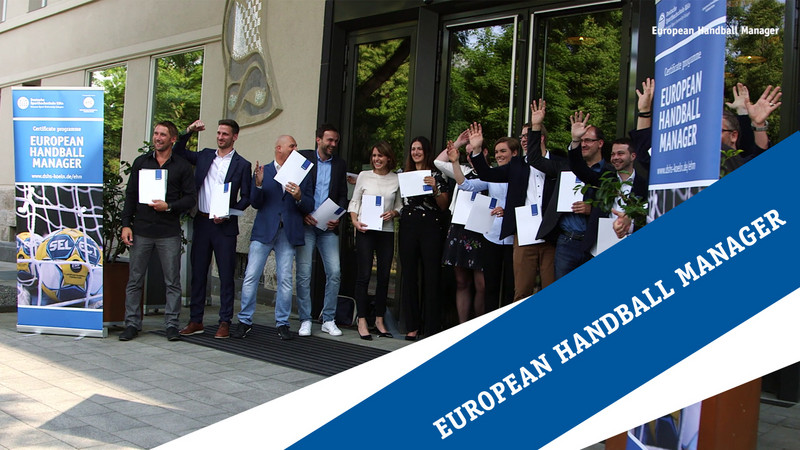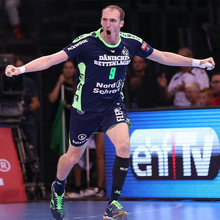European Handball Manager
The last few decades have placed heavy sporting and economic demands on handball organisations. Handball coaches are in the enviable position of having many options for further training courses and qualifications available to them. However, for managers of handball clubs, associations and leagues, no comparable programs exist on either a national or international level.
This is where we come in!
The new and unique certificate programme organized by the European Handball Federation in collaboration with the German Sport University Cologne aims to provide participants with a professional development course which meets modern market needs in this field. In comparison with other certificates, it offers handball-specific, tailor-made content including legal, economic, psychological, media and management aspects.
Degree Content
Participants attend the part-time certificate programme parallel to their jobs. The content of the programme is divided into both self-study and attendance phases composed of 250 lesson units in total. The language of the programme switches each year between English (2024/25 intake) and German (2025/2026 intake). All teaching is carried out by distinguished academics and handball experts with a focus on the legal basics in Europe.
The programme consists of five interdisciplinary modules. Each module comprises both theoretical and practical parts which are taught by experts from various fields including economics, law, communication and psychology:
Module 1: Economic and legal requirements of team sport
The first module focuses on the foundations of sports economics and sports law and the consequences for the management of handball organisations. The course highlights the special features of sport across all areas and how they can be utilized for the creation of added value in handball. The module consists of four themes with the following content:
a) Economic features of team sport:
- Introduction into sport economic aspects (their economic significance, special features and state intervention)
- Economy of sport clubs and leagues (aims, intensity of competition and regulation)
- Live broadcasts of sporting events and TV spectators (determinants and effects)
- Sport events (economic significance and risks)
b) Value-added models in handball:
- Handball matches as service
- Value creation in handball
- Consequences of commercialisation
c) Special features of handball clubs, federations and leagues and the economic consequences thereof:
- Characteristics and special features of non-profit organisations in sport
- Organisational failure, transformation and related issues
- Cooperation and divergence of interests between clubs, federation and league
d) Sports law requirements:
- Constitutional and European law
- Competition and antitrust law
- Regulation of sport organisations
Module 2: Team sport governance and handball management
On the basis of the Module 1 (sports economics and sports law), Module 2 aims deepen the participants' knowledge about the strategic alignment of handball organisations. The main focus is on various governance structures and the interaction between the different sport organisations (clubs, leagues and federations).
This module consists of three main topics with the following content:
a) Governance of team sport:
- International sport organisations and regulations
- European sport systems
- Sport politics in Europe and the European Union
- Governance structures in European handball
- Sport governance in handball organisations
- Current issues of sport governance (e.g. social responsibility, match-fixing, doping, corruption) and the consequences for handball
b) Strategic handball management:
- The process of strategic sport management
- An analysis of internal and external strategic factors of success in handball
- Planning sporting success in handball
- Managing change in handball
- Human resource management
c) Labour law in sports
Module 3: Sport marketing and sponsorship
This module deals with the motives and behaviour of handball consumers, how they are connected to each other and can be influenced effectively. This includes spectators, fans and club members. Furthermore, the module deals with the basic concept of identity-based brand management and its consequences for the management of sports brands. Course participants will gain a deeper knowledge of sport sponsorship. The five main topics in this module cover the following content:
a) Consumer behaviour in handball:
- Motives and behaviour of active and passive sport consumer
- Distinctive features of team sport consume
- Satisfaction and loyalty of fans, spectators and club members
b) Management of team sport brands:
- Basic concepts of identity-based brand management
- Challenges of brand management
- Controlling of brand management
c) Sport sponsorship:
- Sponsorship management (acquisition, development and termination of partnerships)
- Activation and suitability of sponsorships
- Crisis management in sponsorship relations
- Controlling of sponsorships
d) Relationship management in sports:
- Basic concept of relationship management and its relevance for sports
e) Sponsorship law
Module 4: Financing and licensing
During this module, participants will gain specialist knowledge about accounting and licensing in sports corporations and their distinctive features. The course will explain how sports corporations can be operated and controlled more effectively. Finally, the requirements, opportunities and limitations of the licensing process are addressed. The module is divided into five different topics covering the following content:
a) Accounting of sports corporations:
- Financial reporting and bookkeeping obligations
- Sport-specific financial reporting obligations
- Balancing and evaluation of active and passive positions
- The impact of Basel III on sports corporations
b) Sport-specific financing options:
- External financing through bonds and asset-backed securities
- External financing through private investors/strategic partnerships
- Making use of the capital market
- Financing of sports venues (incl. subsidies and public financing)
- Crowdfunding
c) Financial analysis of handball corporations:
- Financial indicators for the evaluation of sports corporations
- Evaluation of player assets
- Evaluating brands of sports corporations
d) Controlling of professional handball corporations:
- Challenges and strategies of risk management in team sports
- Basic information on controlling in sports
- The Balanced Scorecard as a controlling instrument
e) The licensing process in handball:
- Financial criteria and financial reporting
- Possibilities and limitations of the licensing process
- Financial Fair Play
Module 5: Media and communication training
Module 5 aims to develop participants’ skills in terms of sport of media and communication. Besides dealing with medial strategies and journalistic production processes, additional topics are interviewing and conflict management techniques. The module is rounded off with basic information on media law and personality rights. The specific topics covered are the following:
a) Medial strategies in sports media:
- Strategy development of media corporations
- Strategy development of sport federations
b) Logic and processes of journalistic productions:
- Editorial patterns of processing
- Journalistic selection criteria
c) Media training:
- Interview training
- Non-verbal communication, rhetoric
d) Conflict management:
- Strategies of conflict resolution
- Internal and external communication means
e) Media law and personality rights
Contact

Department of further education
Am Sportpark Muengersdorf 650933 Cologne
Main building, 4th floor, room 405b
| Telephone | +49 221 4982-2130 |
|---|---|
| Fax | +49 221 4982-7720 |
| weiterbildung@dshs-koeln.de |

